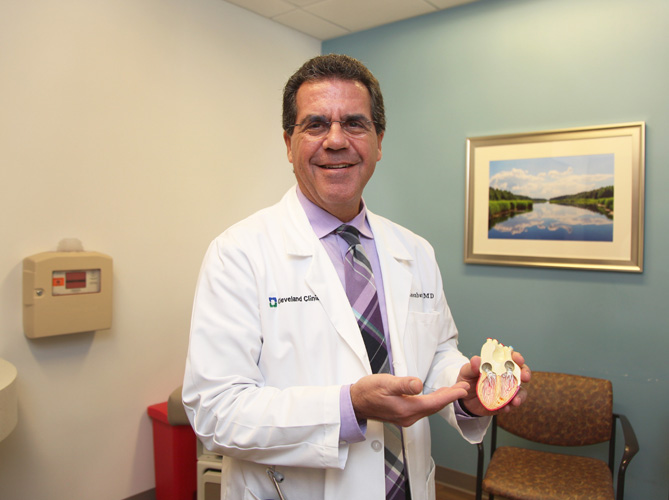
If your auto dealership or mechanic tells you that your car needs a ‘valve job,’ you’re probably in for a pricey repair bill.
If your cardiologist tells you your heart valves aren’t functioning properly, you could well be in for something even more expensive – and much more complex.
Just ask Cleveland Clinic Indian River Hospital cardiologist Dr. Alan Rosenbaum.
Rosenbaum probably can’t help with the 24 to 32 valves in the average V8 car engine, but he’s highly knowledgeable about the four valves of the heart – the mitral, the tricuspid, the pulmonary and the aortic – and that’s a good thing since problems in these delicate valves require an expert hand to repair.
Symptoms of heart valve disease include shortness of breath and/or difficulty catching your breath; weakness or dizziness; discomfort in your chest; palpitations; swelling of your ankles, feet or abdomen; and rapid weight gain, according to medicinenet.com.
If you have some of those symptoms and find that you have a heart valve problem, you have plenty of company.
Today, an estimated 30 million people worldwide have heart valve disease – most of them age 65 or older.
Here in the U.S. 5 million people a year are diagnosed with heart valve disease.
As the National Heart, Lung and Blood Institute points out, human heart valves are made of strong yet quite thin flaps of tissue called leaflets or cusps.
These leaflets open to let blood move forward through your heart during the first half of a heartbeat and then close tight to keep blood from flowing backward during the second half of that heartbeat.
At least that’s they do when they’re working properly.
“Normally functioning valves,” says Johns Hopkins Medicine, “ensure that blood flows with proper force in the proper direction at the proper time but in valvular heart disease, the valves become too narrow and hardened (stenotic) to open fully or they are unable to close completely.”
“Generally,” says the genial Rosenbaum, “we focus on the aortic and mitral valves because those are the valves that are the most important in terms of getting blood flow to the rest of our heart.
“If you have a regurgitant mitral valve, that means the mitral valve is not working properly and it’s allowing blood to flow in an inappropriate direction during the contraction phase of the cardiac cycle. That valve should be closed, and all of the blood should be going out the aortic valve, but with mitral regurgitation blood is flowing backwards during” the contraction phase of the cardiac cycle, reentering the left atrium.
“In terms of stenosis, this is a gradual degeneration of the valve due to calcification. [As we age], calcium deposits end up in our arteries and our arterial walls and in the ventricular walls as well as on the valves. A large proportion of the stenotic valves we see are probably aortic stenosis.”
If your eyes are staring to glaze over, Rosenbaum is quick to offer a simpler explanation.
“Let’s say you have a river and a beaver is building a dam in this river. The beaver is laying sticks down in the riverbed and everything is fine. There’s normal river flow. And then one day the beaver lays that one stick down on the dam and suddenly there’s a lake effect on the upstream side of the dam and a trickle effect on the downstream side of the dam. Well, that’s exactly what happens in aortic stenosis.”
For the record, Rosenbaum is also quick to note that calcification of arteries and valves can’t be blamed on the milk you added to your breakfast cereal yesterday morning.
“This has nothing to do with the calcium in our diets,” Rosenbaum explains. “That’s a very common question that patients ask: Should I cut down on the calcium that I take in? And the answer is no.”
The good news is that most heart valve disease can be effectively treated – often without surgery.
And if a valve replacement procedure should be called for, the Cleveland Clinic Indian River Hospital’s Welsh Heart Center is a national leader in heart valve replacement procedures.
“I would talk to your doctor if you notice anything unusual,” says Rosenbaum in a reassuring tone. “If you know you have a mild valvular problem and you notice any new symptoms [including shortness of breath with exertion, arrhythmias or maybe some chest discomfort or swelling in the legs] you should mention these to your doctor so that we can get working on seeing if your valvular heart disease has progressed.”
Dr. Alan Rosenbaum is a cardiologist with the Cleveland Clinic Indian River Hospital. He has offices in Vero Beach at 3450 11th Court in the hospital’s Health & Wellness Building and in Sebastian at 801 Wellness Way, Suite 203. The phone number is 772-778-8687.



